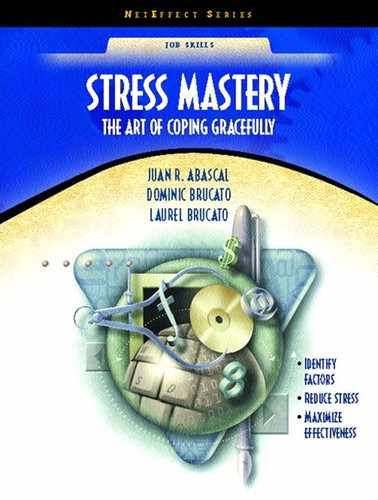Reviewing the Master Strategy: Stage 2
Acquiring Body Wisdom
Fake it till you make it. Act how you want to be until it comes naturally.
Adopt the stance of the peaceful warrior.
Focus on the here and now.
Change your physiology.
Learn to listen to your body. If you listen to your body when it whispers, you won't have to listen to it scream.
Cultivate relaxation skills.
Begin with breathing.
Follow with progressive relaxation.
Use the systematic process of tensing and relaxing each muscle group slowly and individually, allowing you to develop awareness of bodily tension and then enabling you to release it.
Coordinate this with your breathing.
Combine with relaxing imagery.
Use autogenic training—a process of repeating relaxing phrases to yourself regarding pinpointed muscle groups.
Use stretching exercises to lengthen muscles and release tension.
Follow your intuition about which muscles to stretch.
Go slow—if you feel pain you are stretching too hard.
You can stretch anywhere, anytime if you feel muscular tension building up.
Use stretches 1–3 to help prevent tension headaches.
Changing Your Perspective
Problems are not what happens to you but what you tell yourself about what happens. To a great extent, our perceptions determine whether we will experience stress, as well as the severity of the stress.
The art of reframing is useful.
Find a different perspective.
The magical effect of humor
Life as a sitcom
Life as a novel
Special effects
Shift your point of view.
Give up being right.
Operating in a win/lose perspective in interpersonal situations ultimately leads to everyone losing.
Would you rather be right or happy?
The question of who is winning in a marriage is ridiculous.
Looking for win/win outcomes in relationships reduces stress.
How do you give up being right?
Begin with breathing.
Learn to step into the shoes of the other person. Make an attempt to really listen to her concerns, to see out of her eyes, and to adopt her perspective. This does not mean you have to agree with her, but only that you really attempt to understand her point of view and feelings.
Is there any merit or validity in the other person's point of view? The answer is almost always yes.
Deal with irrational beliefs
Catastrophizing increases stress.
Catastrophizing is triggered by self-talk or automatic thoughts.
Irrational beliefs exacerbate stress.
Use cognitive restructuring to refute irrational beliefs.
Identify the irrational belief.
Challenge the irrational belief with rational questions.
Substitute new rational beliefs. In time this process will feel natural.
Remember that the map is not the territory.
Your perceptions are not reality—only subjective interpretations.
Some maps are more useful than others.
Optimism is the most useful map.
Remember that optimism reduces stress.
Assess the cost of failure to determine whether to be optimistic.
Learn to become an optimist.
Look for evidence contrary to negative thoughts.
Generate other alternatives than negative ones.
Realistically assess the implications of the situation.
Evaluate the usefulness of a particular belief.
Pathways Through Anger
The relationship between anger and stress
Anger had far more survival value for our ancestors.
Anger is physiological arousal leading to the fight-or-flight response.
When under stress, we look around for who is to blame.
The relationship between anger and control
You always have a choice about whether to respond with anger.
It is your interpretation of an event—not the event itself—which leads to anger. The way you see the problem is the problem.
You have a right to be angry, but are you happy with the results?
Sustained and chronic anger negatively affects your health.
The hostility component of the Type A personality is correlated with heart disease.
Learning to control anger decreases the rate of recurrent heart attacks.
Anger is linked to many other psychosomatic disorders.
Anger leads to win/lose scenarios, which damages relationships.
Anger is not always bad. It is harmful only when it is chronic and unresolved. Anger can help mobilize your energy to take constructive action.
It is not always possible to prevent anger, but it is important to learn how to move through it effectively.
The only way out is through.
Anger is a signal that you must address an issue.
Use reframing strategies to help move through your anger.
Be a comedy writer on your own life. Look for the humor or absurdity in the situation to help defuse your anger.
View the situation as a chapter in your life. What is there to be learned from this dilemma?
View criticism as feedback.
Recognize that it is your behavior that is being addressed, not your worth as a human being.
Criticism reflects the critic. Examine the validity of feedback without defensiveness, but take it to heart only if there is truth to it.
Mistakes are not necessarily always bad. You are human and entitled to err. Mistakes are our teachers.
Forgive
Forgiveness does not mean forgetting, but rather letting go of anger.
Holding a grudge takes a toll on you. Forgiveness is more for yourself than for the other person.
It is totally up to you whether to forgive, whatever the behavior of the other (whether he or she is apologetic or not).
The most important person to forgive is yourself, over and over and over again.
